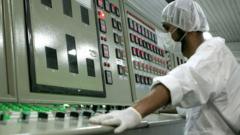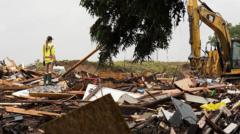The U.S. and Iran are preparing for high-level discussions regarding a potential nuclear deal on Saturday, with both sides expressing cautious optimism despite longstanding strains in their relations. Iranian officials described the meeting as an opportunity and test for the U.S., as concerns regarding Tehran's nuclear ambitions grow.
U.S.-Iran Nuclear Talks Set to Begin Amidst Tensions

U.S.-Iran Nuclear Talks Set to Begin Amidst Tensions
President Trump announces planned discussions with Iran regarding nuclear capabilities as international concerns mount over Tehran's uranium enrichment.
The United States is set to hold high-level discussions with Iran on Saturday regarding a potential new nuclear agreement, as announced by President Donald Trump. This decision follows a surprise acknowledgement and is preceded by a meeting between Trump and Israeli Prime Minister Benjamin Netanyahu, who has voiced concerns about Iran’s nuclear advancements. Iran's foreign minister later stated that the talks in Oman would be indirect but may serve as both an opportunity and a test for U.S.-Iran relations.
Trump, who withdrew the U.S. from the 2015 nuclear agreement during his previous term, highlighted the high stakes of these negotiations, warning that Iran would face serious risks if they do not succeed. He emphasized that a renegotiated deal would be preferable to military options, a sentiment echoed by Netanyahu, who stressed the importance of preventing Iran from acquiring nuclear capabilities.
Iran has consistently maintained that its nuclear program is peaceful, yet it has increasingly violated the terms of the prior deal, largely in response to heightened U.S. sanctions imposed seven years ago. Tehran's stockpile of enriched uranium has sorely increased, raising alarms among international watchdogs and global powers who remain skeptical about the regime's intentions.
U.S. National Security Adviser Mike Waltz clarified that the administration's objective for the talks includes full dismantlement of Iran's nuclear capabilities. However, Iranian officials have firmly rejected any suggestions to dismantle their program, likening the U.S. to Libya's past denuclearization, which they deem incompatible with their objectives.
Despite the longstanding hostilities between the U.S. and Iran since the 1979 Islamic Revolution and the subsequent severance of formal diplomatic ties, both countries have hinted at a willingness to engage once more. Tehran's Supreme Leader Ayatollah Ali Khamenei had previously dismissed a letter delivered by Trump, deeming it an attempt at manipulation. Yet, after subsequent communications from Iranian President Ebrahim Raisi, the door has been left slightly ajar for negotiations to continue.
The Iran nuclear situation remains precarious, with the potential for these discussions to reshape the future landscape of international relations and regional security in the Middle East. Following years of sanctions and the isolation of Iran, renewed dialogue may provide an avenue for de-escalation, although significant hurdles remain.



















